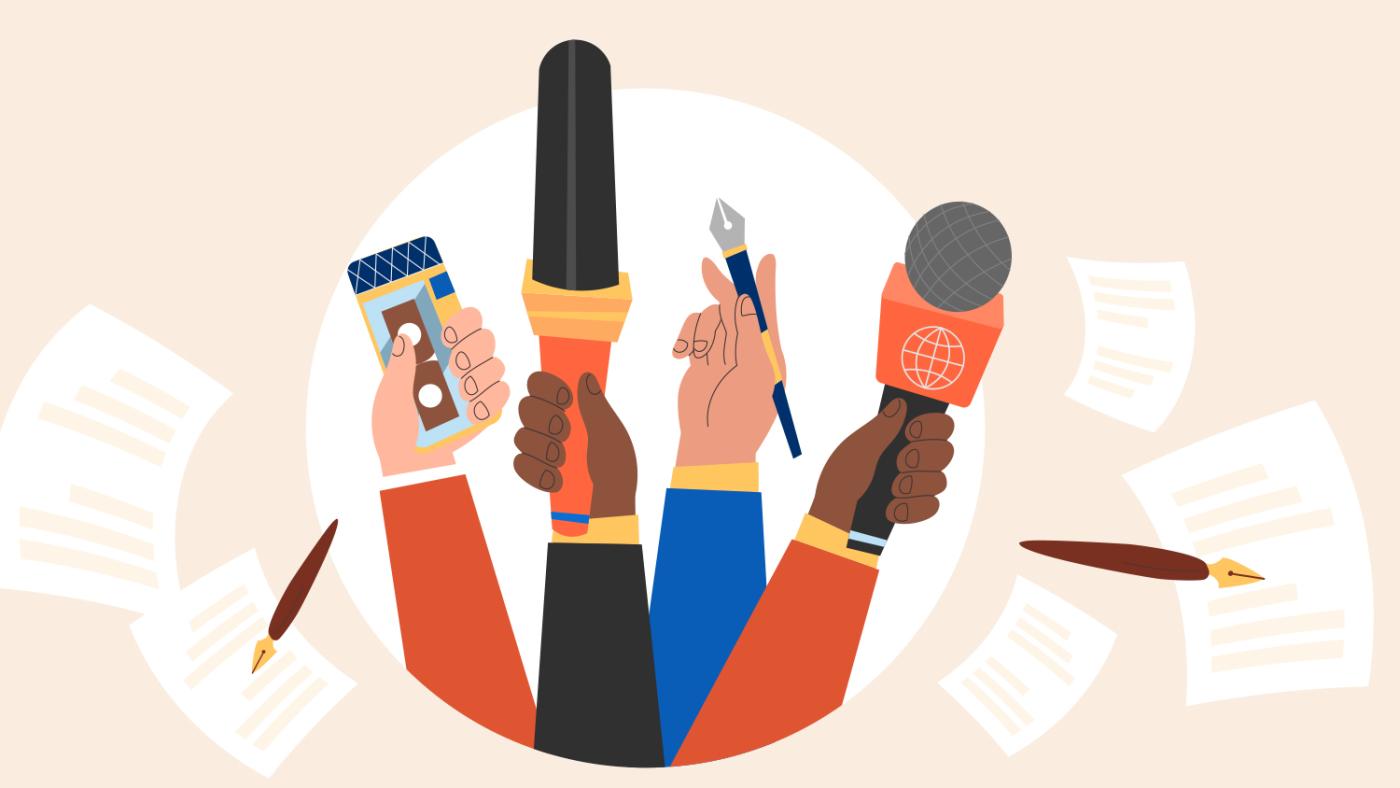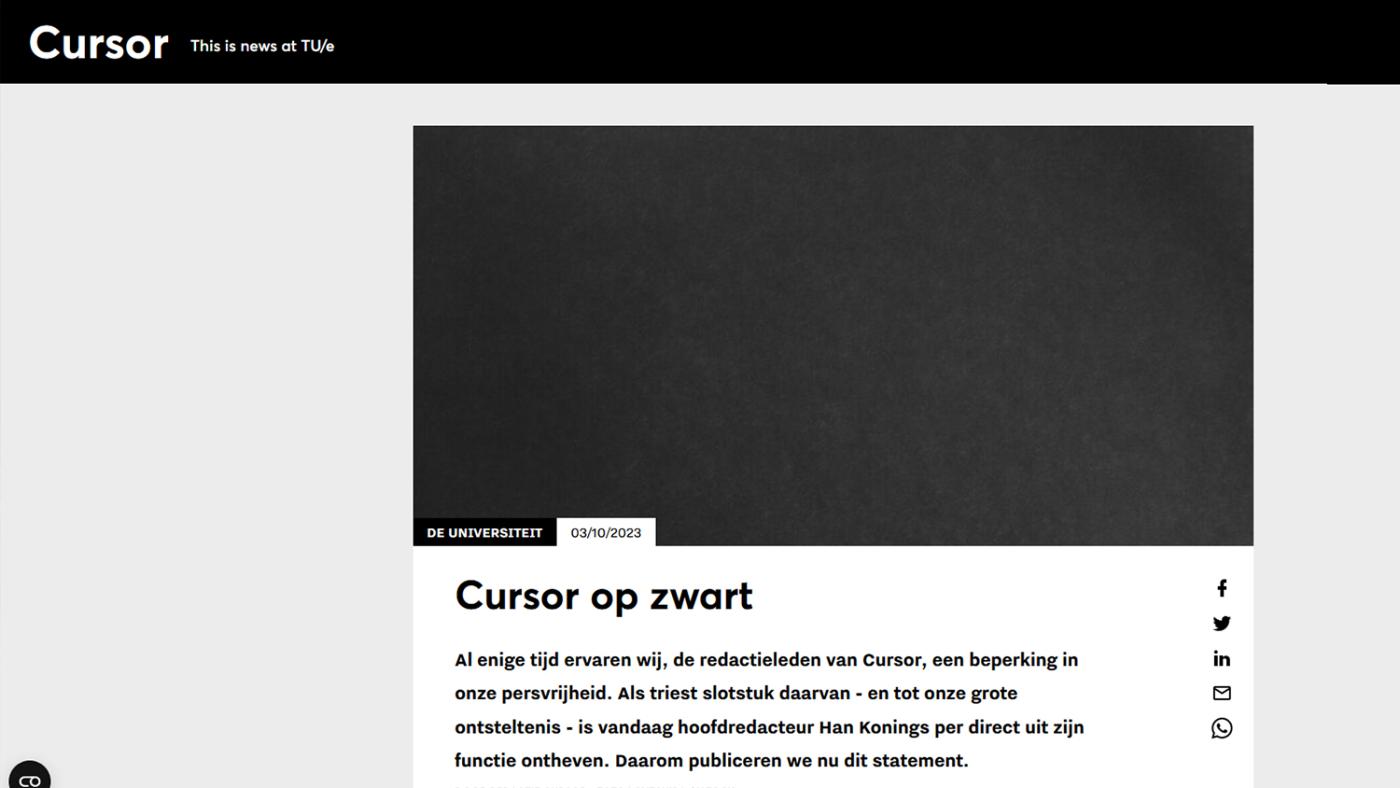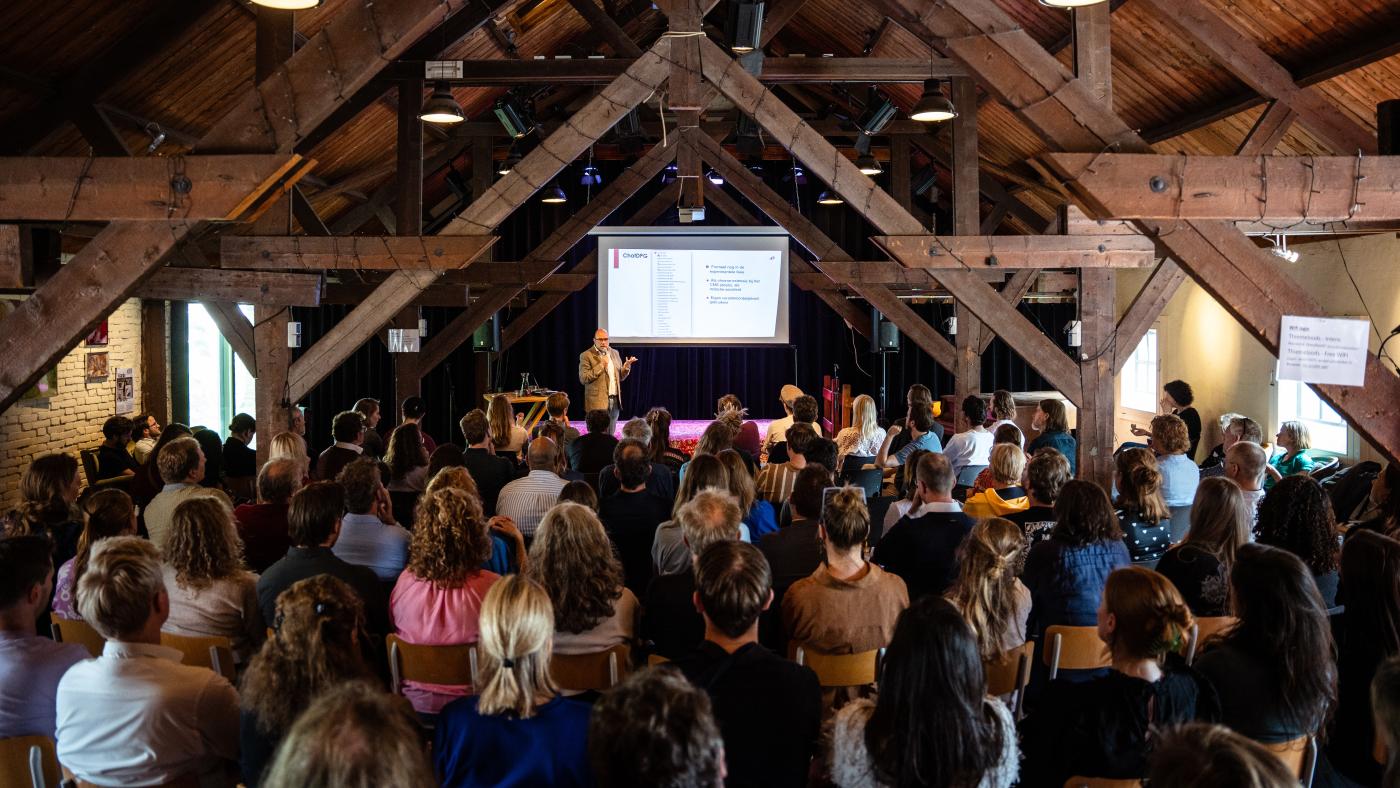Increasing problems caused by dissatisfied students
Press freedom remains under pressure at higher education media

After months of conflicts with the university administration, the editors of Cursor (the independent news outlet of the Eindhoven University of Technology) shut down the website in October 2023 as a protest against the editor-in-chief’s suspension. A year later, the Executive Board of the Delft University of Technology (TU Delft) compelled the news outlet Delta to remove a critical article. In 2022, hackers took down the website of Maastricht University's news medium, Observant, accusing the editors of ‘transphobic language’. These and other conflicts surrounding academic press freedom have made nationwide news in recent years. What is the current state of press freedom in higher education media? And what lessons have editors drawn from such incidents?
Fixation on image
Cursor's editor, Bridget Spoor, was ‘flabbergasted’ when she heard that the outlet's editor-in-chief, Kan Honings, would not publish her article about a professor whose behaviour had been inappropriate. Not because she did not provide enough sources or evidence, but because the editorial board did not agree with the article. Although Konings was formally allowed to publish, Honings still refrained from doing so because of considerable tensions with the university's Executive Board. He also refused to publish a critical piece on the new rector a few months later. 'He was like, 'It’s a good piece, but publishing it will wreck our relationship with the board and invite reprisals. We’ll lose funding or our jobs,'" she recollects. 'And I said: "If that argument is in our heads, we are already lost.'”
Afterwards, an independent commission ruled that the university administration had violated the internal rules safeguarding Cursor’s press freedom by exerting pressure on the editor-in-chief.

Controversies regarding press freedom in higher education media are not a recent phenomenon. Ries Agterberg, editor-in-chief at DUB (Utrecht University), says that administrators’ fear of unpalatable news about their campuses rose sharply in the nineties. A neoliberal political trend encouraged institutions to engage in constant competition and be fixated on their image. “Such profiling by the universities themselves has abated a bit”, according to Agterberg. “Back then, they were much more sensitive about negative news leaking out. Today, they mainly try to avoid offending others in matters like diversity. They ride along on trends.”
Even so, potential reputational damage caused by negative news remains a sensitive issue for many executive boards, as shown by interviews with eight news platforms. Saskia Bonger, editor-in-chief at Delta, mentions the strained contact with certain press officers who have since left. “They often questioned our integrity. If we had any questions, there would be a long discussion on whether those were the right questions to ask. It was obvious to me that this was intended to make us doubt ourselves. It was clear gaslighting.”
Weak editorial statute
Edith van Gameren, editor-in-chief at Profielen (Rotterdam University of Applied Sciences), says the editorial staff has disagreements regarding press freedom about once a year. “There’s always friction. Suppose we find a shortcoming in the quality of education. We will then ask the Executive Board to react, as the university’s purpose is to provide a good education. At that point, they may try to pull the emergency brakes by turning to the editorial board. A sort of game will ensue: 'What’s the point of writing this? Are they observing the rules of good journalism?'”
The editorial board bases its judgment on the editorial statute, but journalistic independence is not the statute’s leading principle. “Our statute says that we must serve the interests of the university of applied sciences”, Van Gameren points out. “That’s a formulation that allows for restrictions on what we can write. When does transparency stop serving the institution’s interests?”
Profielen's situation is not exceptional. At Cursor, things got out of hand partly because of an editorial statute that prohibited journalists from harming the institution’s interests. The editorial statute has since been replaced with a robust document that better enshrines Cursor’s press freedom. “It feels like a buffer now, a protective layer that fits like a glove”, Spoor observes. “We’ve also been allowed to nominate people with journalistic expertise for the editorial board. All the checkboxes are ticked now, which gives me peace of mind.”
In Delft, the conflict between Delta and the university administration also led to a revision of the editorial statute. Other editorial boards are also revising their charters. Although the editors of Resource (Wageningen University & Research) rarely find themselves on a collision course with the current Executive Board, editor-in-chief Willem Andrée prefers to err on the side of caution. “Our statute will now get an additional sentence saying that Resource cannot be used for any particular interest. It is not marketing. Universities are funded by public money, which simply involves a countervailing power.”

Dutch higher education media outlets gathered in Nijmegen in 2024 for their annual congress.
Harassment
Administrators are not the only ones sometimes making things hard for higher education media. Students, too, often disagree with the content or want their names removed from the website after being featured in articles and having second thoughts.
Once something appears on the Internet, anyone can find it, even years later. Erasmus Magazine's editor-in-chief, Wieneke Gunneweg, still remembers when students tried to haul away stacks of newspapers because they disliked the content. These days, if someone wants to stop others from reading a publication, they must rely on the editors to take it offline. Attempts to do so can sometimes take on nasty forms, Gunneweg says.
“A few weeks ago, we ran a story about a party for queer students of colour. One of our freelancers, who enjoys going to such parties, wrote a feature about it. She worked according to journalistic rules, but was violently harassed after the article was published. The intimidation came from different sides: from people involved with the party to people who had a problem with it. Things escalated drastically, even though we had worked conscientiously and per journalistic rules. Our employee was badly intimidated.”
Gunneweg now finds that disgruntled students exert more pressure on higher education media than troublesome administrators. “I’ve seen this in the last few years. Sometimes, I trace it back to the pandemic, when social developments became turbocharged, and groups pitted against each other. Everything that happens in society finds its way to the university.”
Siebelink can relate. “I usually have more problems from that angle than from the university administration. Last year, for example, pro-Palestinian activists set up a tent camp next to the editorial office. I come from the newspaper world, so I’ve been to wars, threats don’t get to me easily. But what they did back then was intimidating. Their attacks would be ad hominem: ‘Rob Siebelink, you are the editor-in-chief, you have blood on your hands if you’re not on our side.’ That kind of thing.”
Last year, Siebelink felt he had to report threats and harassment to the police on three occasions. “Polarisation and hardening stances are a feature of society. But when you find yourself going to the police three times, that does give you food for thought.”
To avoid anger and misunderstanding, Gunneweg tries to be more transparent about her outlet's journalistic decisions. In accountability boxes, Erasmus Magazine explains how articles were crafted. The editor-in-chief has also begun to monitor her own boundaries a little more closely. “In the past, when people seethingly walked into our office, we would drop everything and talk to them. There came a point when I said: 'Right, but we’re not going to go on like this. If someone’s angry, fine. Can we settle the matter in five minutes? If we can’t, they’ll just have to make an appointment.”